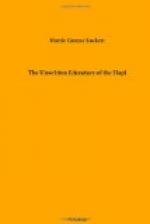Now the Bear and Snake people who lived in Walpi drew a line of meal across the trail, a warning understood by many primitives, and challenged the new-comers as to who they were, where they were going, and what they wanted. Then the Flute chief said, “We are of your blood, Hopi. Our hearts are good and our speech straight. We carry on our backs the tabernacle of the Flute Altar. We can cause rain to fall.”
Four times the demand was repeated, as the Flute people stood respectfully before the barrier of meal, and four times did their chief make the same reply. Then the Walpis erased the line of meal and the Flute people entered the pueblo, set up their altars and demonstrated their rain magic by singing their ceremonial Flute songs which resulted in bringing the needed rain. Then said the Bear and Snake chiefs, “Surely your chief shall be one of our chiefs.”
Thus we see that the Flute Dance as given today is a dramatization of this legend. Dr. Fewkes, who collected this legend, tells us that the Flute fraternity claims to be even more successful rain-makers than the world-famous Snake fraternity.[26]
[Footnote 26: Fewkes, J. Walter, The Walpi Flute Observance: Journal American Folklore, vol. 7, 1894.]
Dr. Monsen tells of seeing the Flute ceremony at Mishongnovi, a good many years ago, and of the deeply religious feeling that pervaded the whole scene. His words are descriptive of a dramatic moment at the close of the day, when the procession had at last reached the public plaza on top of the mesa.[27]
[Footnote 27: Monsen, Frederick, Religious Dances of the Hopi: The Craftsman, vol. 12, 1907, pp. 284-285.]
[Illustration: Figure 7.—Hopi Girl in Butterfly Costume.
—Photo by Lockett.]
“By this time it was nearly dark, but the ceremony went on in the center of the plaza where other mysterious symbols were outlined on the rocky floor with the strewn corn meal, and numbers of supplementary chants were sung until night closed down entirely and the moon appeared.... Then came something so extraordinary that I am aware that it will sound as if I were drawing on the rich stores of my imagination, for the coincidence which closed the festival.
“But all I can say is that to my unutterable astonishment, it happened exactly as I tell it. At a certain stage in this part of the ceremony there was a pause. No one left the plaza, but every one stood as still as a graven image, and not a sound broke the hush, apparently of breathless expectancy. The stillness was so unearthly that it became oppressive, and a few white friends who were with me began to urge in whispers that we leave the plaza as all was evidently at an end, and go back to our camp below the mesa, when suddenly there rang out such a wild, exultant shout of unrestrained, unmeasured rejoicing as only Indians can give in moments of supreme religious exaltation—raindrops had splashed on devout, upturned faces.




